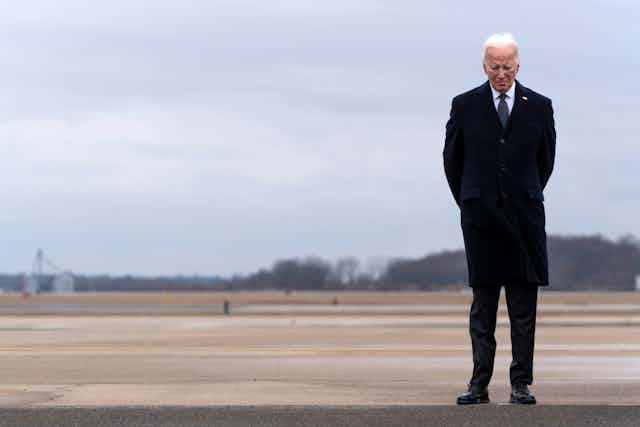The United States mounted more than 125 retaliatory strikes against Iranian forces and Iranian-backed militias at seven military sites in Iraq and Syria on Feb. 2, 2024, after a drone strike killed three U.S. soldiers and injured 34 more in Jordan on Jan. 28.
The retaliatory strikes, which U.S. military officials say hit 85 targets, including command and control operations centers, intelligence centers and munition supply chain facilities, are the latest chapter in the Middle East conflict, which President Joe Biden has tried to avoid escalating.
Biden announced on Jan. 30 that he had decided how to respond to the drone strike that killed the soldiers and said, “I don’t think we need a wider war in the Middle East.” The Islamic Resistance in Iraq, an Iranian-backed militia group, claimed responsibility for the attack, while Iran denied any direct involvement in it.
The U.S. retaliatory strikes happened hours after the remains of the American soldiers were returned to the U.S.
The Conversation U.S. spoke with Gregory Treverton, a former chairman of the National Intelligence Council in the Obama administration, to understand the strategic thinking behind this retaliatory attack.

What are some of the factors that likely played a role in the US deciding to launch a retaliatory strike and when to launch it?
Regarding timing, the president may have wanted to get the bodies of the service people who were killed in Jordan back home and give some time for everyone to think. In the last few days, we saw that Iran and Iraq did put pressure on some of the proxy groups to wind down their operations. In one case, one of these Iran-backed militia groups in Iraq agreed to cease operations this last week. Iran also said that they do not want a wider war with the U.S.
With the time it took Biden to authorize the strike, it also gave the Iranian soldiers and others time to move out of harm’s way, if they wanted to leave the military bases.
More strategically, Biden already committed earlier this week to make some kind of response, and he was under all kinds of political pressure to do something. But he still appears to be trying to avoid further escalating the conflict.
Biden, for example, avoided striking Iranian territory directly, though some Republicans had pressured him to do so.
Iran says it wants to avoid a war with the US. But its proxy group just struck a US military base. Does that imply some sort of internal friction there?
In our own country’s experience with proxy groups, we know that they have their own interests, and there are also the interests that we share. Sometimes, proxy groups that the U.S. has backed act in a way we don’t like and are just in their own interest. These proxy relationships are always complicated, in that sense.
Even if Iran wants to avoid further escalation with the U.S., my guess is that many of these groups would not mind a broader conflict happening, if their goals are more apocalyptic, such as destroying Israel.
What do these retaliatory strikes accomplish?
I think they accomplish fulfilling the Biden administration’s commitment to do something significant and respond to the drone strike killing U.S. soldiers. The response itself is measured enough so far that it is unlikely to escalate the conflict dramatically, though we could be surprised by that.
Overall, it is a calibrated measure that plainly is not going to entirely degrade the military capacity of any of these groups. But it should still have a pretty significant effect and weaken their military capabilities, at least to some extent.

What else is most important to understand about these retaliatory strikes?
The wider context here is that the U.S. strikes make it all the more important to get to some cease-fire in Gaza. At least then, these proxy forces would lose that rationale – of Israel’s attacks on Gaza – to justify what they are doing.
It seems to me we are still seeing no real sign from the Israelis of a sense of an endgame in this war. We presume that the Israeli government is thinking about some way to reform the Palestinian Authority or consider some coalition of Arab states, maybe the U.S. and European countries, to govern Gaza once the war ends. But we have not seen any sign of that publicly.
So, as long as the war continues in Gaza and as long as Palestinians are being killed, these proxy groups see this as their only way to respond.

